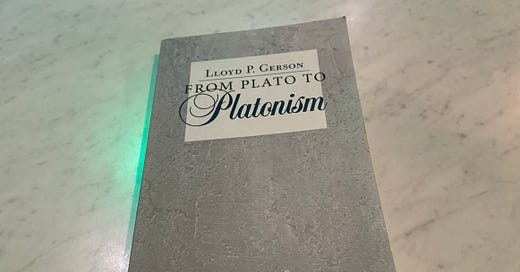The Plato scholar Lloyd Gerson makes the point that identifying what “Platonism” is is fraught with controversy in the scholarly literature.
The questions are many.
Is it the dialogues alone that constitute “Platonism”? Further, are the dialogues a unitary whole, a developmental sequence (early, middle, and late), or a series of unsystematic aporias and divergent paths full of competing perspectives?
And do the dialogues need to be thought in conjunction with the so-called unwritten doctrines, the oral tradition passed down through Plato’s Academy?
If so, what is the nature of the unwritten doctrines? What is their relation to the written dialogues? Do these two streams, taken together, constitute a “whole”?
What of Plato’s students, interlocutors, and progeny (Aristotle, Proclus, Plotinus, etc.)? How do their testimonies fit into this picture?
It’s a complex case, and this is only a thin telling of it.
What I find compelling about Gerson’s attitude to this question of Plato and Platonism is that he suggests the answer lies in a via negativa method.
In other words, Gerson suggests that “Platonism” can best be identified, at least in a first pass, by a series of rejections of certain philosophical stances.
What does Platonism reject?
Five positions, says Gerson: materialism, mechanism, nominalism, relativism, and skepticism.
The key here is that one holds these negations together, as a constellation of nots-, that is, reality is found through not-materialism, not-mechanism, not-nominalism, not-relativism, and not-skepticism.
The question, what is reality? takes shape in this negative space, and this negative space is where the Platonic metaphysic takes flights.
From these negations, Gerson says, one can derive the many varieties of “Platonism” we see across history, if one stays logically consistent with the consequences of holding to these specific constraints.
However, one should note that these constraints do not commit one to a narrow approach to philosophical life, nor to a narrow world made present within it.
Indeed, as Gerson says, “One of my main conclusions is that Platonism is a big tent and that within that tent are found parties disputing numerous issues.”
The great example Gerson gives is that of Aristotle, who rejects the same five postulates as Plato but then charts the negative space in a different way.
Acting within this negative space, then, is in its most broadly construed sense what Gerson means by “Platonism” and Plato’s own version of “Platonism.”
Gerson then contends that “Platonism” is just a name we give to a philosophy older than Plato's, a tradition of thought of which Plato was a particularly luminous expositor but that predates him.*
I find this a highly productive and unorthodox way of reading Plato and Platonism.
*One could point to the many ways that Plato extends and transforms this tradition of thinking, but that's a story for another post.
Recommended Readings on Plato and Platonism
Lloyd P. Gerson – From Plato to Platonism
J.N. Findlay – “Towards a Neo-Neo-Platonism” and Plato and Platonism
A.H. Armstrong – “Plotinus” in The Cambridge History of Later Greek and Early Medieval Philosophy
Eric Perl – Theophany, Thinking Being, and “Sense Perception and Intellect in Plato”
Andrea Wilson Nightingale – Spectacles of Truth in Classical Greek Philosophy, “On Wandering and Wondering,” and Philosophy and Religion in Plato’s Dialogues
Martin Heidegger – “Plato’s Doctrine of Truth” in Pathmarks
Pierre Hadot – “The Oral Teaching of Plato” in The Selected Writings of Pierre Hadot and Plotinus or the Simplicity of Vision
Eric Voegelin – “Reason: The Classic Experience” and “In Search of Order” in The Eric Voegelin Reader
Dmitri Nikulin – “Plato: Testimonia and Fragmenta” in The Other Plato: The Tübingen Interpretation of Plato’s Inner-Academic Teachings





